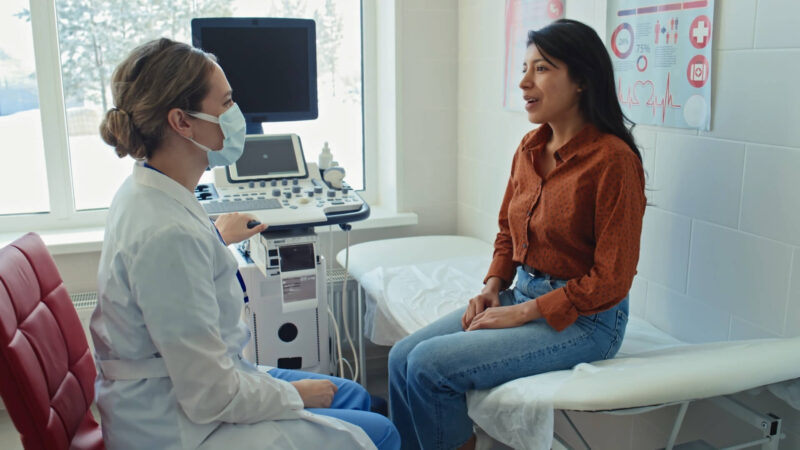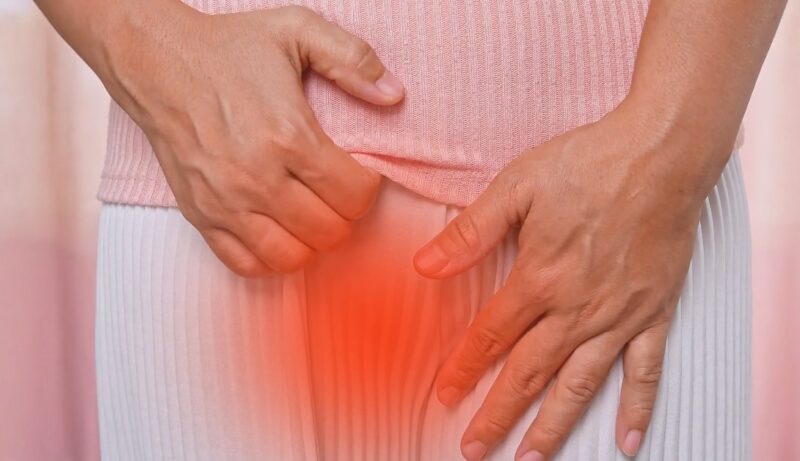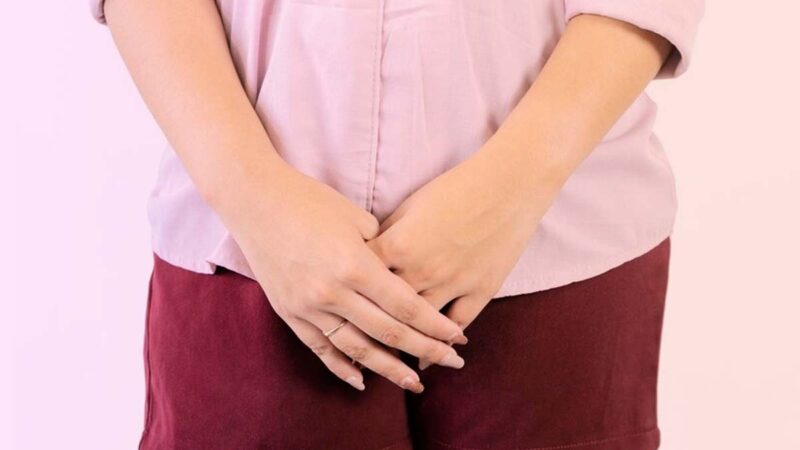Postpartum vaginal dryness is a common yet often unspoken challenge that many new mothers face after giving birth.
This condition, marked by a noticeable decrease in vaginal lubrication, can lead to discomfort, itching, and pain, especially during intercourse. It’s a natural consequence of the significant hormonal shifts that occur in a woman’s body post-delivery, particularly the decrease in estrogen levels.
That is why we want to shed light on postpartum vaginal dryness, offering insights and practical advice to help navigate this aspect of postpartum recovery with confidence and comfort.
Key Takeaways:
- Effective management of postpartum vaginal dryness involves a comprehensive approach that includes: consulting healthcare providers, using lubricants and moisturizers, and lifestyle adjustments.
- The condition is characterized by a decrease in vaginal lubrication leading to discomfort, itching, and pain, especially during intercourse
- Postpartum vaginal dryness affects a high number of women for up to six months after giving birth.
Strategies for Relief and Management
Reducing postpartum vaginal dryness involves a complex approach that addresses both the physical symptoms and the underlying hormonal changes after giving birth. Here are several strategies that can help manage this condition effectively:
Consult Healthcare Providers

The first step in managing postpartum vaginal dryness is to discuss your symptoms with a healthcare provider. They can offer personalized advice, diagnose any underlying conditions like postpartum thyroiditis, and suggest appropriate treatments.
For symptoms related to hormonal imbalances, healthcare providers may recommend estrogen vaginal creams that can help replenish estrogen levels locally, thereby improving vaginal lubrication and tissue health.
Use of Lubricants and Moisturizers:
| Strategy | Description | Benefits | Usage |
|---|---|---|---|
| Vaginal Moisturizers | Over-the-counter products that alleviate dryness by mimicking natural lubrication. | Relief for several days, useful for ongoing discomfort. | Use independently of sexual activity. |
| Lubricants (Water-based or Silicone-based) | Reduce friction and pain during sex, enhancing comfort. | Improves sexual comfort and enjoyment. | Choose products designed for vaginal use. |

Lifestyle Adjustments:
| Strategy | Description |
|---|---|
| Hydration | Essential for overall health, aiming for at least 2 liters of water daily helps maintain hydration, including in the vaginal area. |
| Avoid Douching and Scented Products | Avoiding douching and scented products prevents stripping natural oils, reducing vaginal dryness. |
| Topical Estrogen Therapy | Recommended for some women with severe dryness due to low estrogen levels, enhancing vaginal moisture. |
Open communication with your partner about your discomfort and needs can help ease the strain on your intimate relationship. Looking for alternative forms of intimacy that do not cause discomfort can also be beneficial during this recovery period.
Finally, it’s important to remember that postpartum recovery is a process, and it may take time for your body to adjust back to its pre-pregnancy state. Vaginal dryness is typically temporary and should gradually improve as your hormone levels stabilize.
“Roughly 43% of postpartum women report experiencing vaginal dryness six months after giving birth.” – BMC/BioMed Central study, 2018
Symptoms and Effects
The effects of postpartum vaginal dryness are not just physical discomfort, they impact new mothers on an emotional and psychological level as well.
Physical Symptoms

Physically, the most direct impact of postpartum vaginal dryness is on the vaginal tissues themselves. The decrease in estrogen and progesterone leads to thinner, less elastic tissues, which can cause a range of discomforts.
| Symptom | Description |
|---|---|
| Persistent Dryness | Ongoing lack of vaginal lubrication, not alleviated by arousal. |
| Burning Sensation | Constant irritation in the vaginal area, not limited to sexual activity. |
| Inflammation | Redness, swelling, and tenderness of the vaginal tissues. |
| Pain During Intercourse | Discomfort to severe pain during sex, potentially leading to avoidance of sexual activity. |
| Bleeding | Minor bleeding post-intercourse due to fragile vaginal tissues. |
Emotional and Psychological Impact

The emotional repercussions of postpartum vaginal dryness are worth considering. Many women grapple with feelings of inadequacy, stemming from their struggles with physical intimacy and the changes in their sexual relationships.
| Symptom | Description |
|---|---|
| Feelings of Inadequacy | Emotional distress over changes in physical intimacy and sexual relationships. |
| Depression and Anxiety | Mood swings, irritability, and stress related to physical symptoms and life adjustments. |
| Symptoms of Postpartum Thyroiditis | Shakiness, palpitations, irritability, difficulty sleeping, weight gain, fatigue, sensitivity to cold, and depression. |
Emotional Support and Communication
Postpartum vaginal dryness requires not only physical remedies but also emotional support and open communication, particularly with one’s partner.
The emotional toll of experiencing discomfort during intimacy can strain relationships, making support and understanding from partners crucial during this time. Here are ways to foster emotional support and communication:
Open Dialogue with Your Partner

It’s essential to communicate openly with your partner about what you’re experiencing. Discussing your feelings, symptoms, and the impact on your intimacy can help your partner understand your needs and how they can support you. This open dialogue can strengthen your relationship by fostering empathy and patience.
Adjust Expectations
It’s important to adjust your expectations regarding intimacy postpartum. Recognize that your body has undergone significant changes and that returning to your pre-pregnancy sexual life may take time. Patience and understanding from both partners are key during this adjustment period.
Professional Guidance
If sexual discomfort persists despite self-management strategies, consulting a healthcare provider or a sex therapist can provide additional support. Professionals can offer tailored advice, suggest therapeutic options, and sometimes just the reassurance that what you’re experiencing is normal and manageable can be incredibly relieving.
FAQs
Can nursing babies smell their mothers?
Yes, nursing babies can smell their mothers. Infants have a highly developed sense of smell at birth, which helps them to identify their mothers and find comfort in their scent, especially during breastfeeding.
What is the 5 5 5 rule for postpartum?
The 5 5 5 rule for postpartum isn’t a widely recognized guideline. Postpartum advice and guidelines can vary, so it’s possible this rule could be specific advice from a particular source or a misunderstanding. Generally, postpartum recovery tips are tailored to individual needs rather than a one-size-fits-all rule.
Do hips widen permanently after childbirth?
Hips can widen during pregnancy due to the relaxation of ligaments and changes in the pelvic structure to accommodate childbirth. For some women, this change may be permanent, while for others, the hips may return to their pre-pregnancy width over time.
Why do women’s thighs get bigger after pregnancy?
Women’s thighs may get bigger after pregnancy due to weight gain, hormonal changes, and fluid retention that are common during pregnancy. These changes are part of the body’s preparation for childbirth and breastfeeding.
The Bottom Line
Postpartum vaginal dryness is a prevalent condition that many new mothers encounter, yet it often remains underdiscussed. It’s a natural outcome of the hormonal adjustments the body undergoes after childbirth, particularly the decrease in estrogen levels.
This condition not only causes physical discomfort but can also have significant emotional and psychological impacts, affecting a woman’s sense of well-being and intimacy with her partner.
The strategies for relief and management, ranging from the use of lubricants and moisturizers to consulting healthcare providers for personalized treatments, offer effective ways to alleviate symptoms and improve quality of life during the postpartum period.
